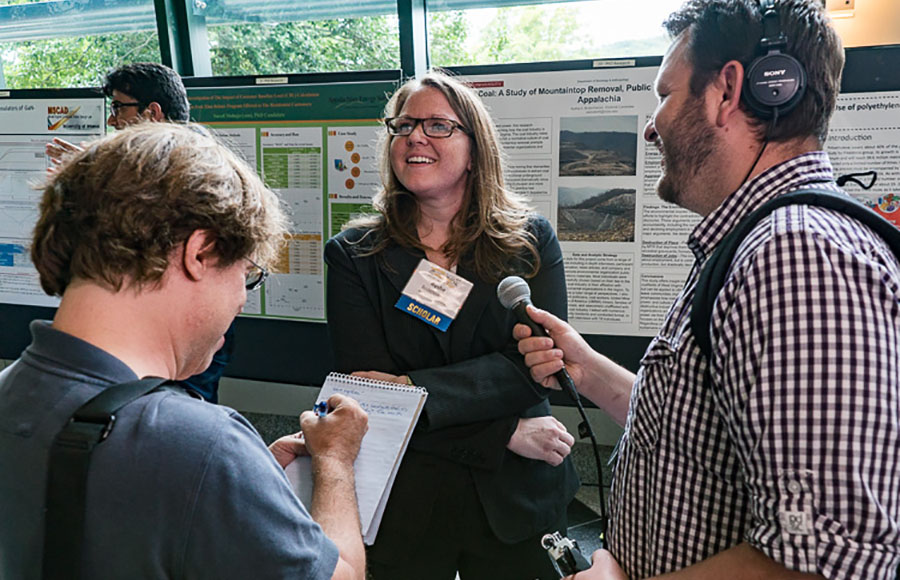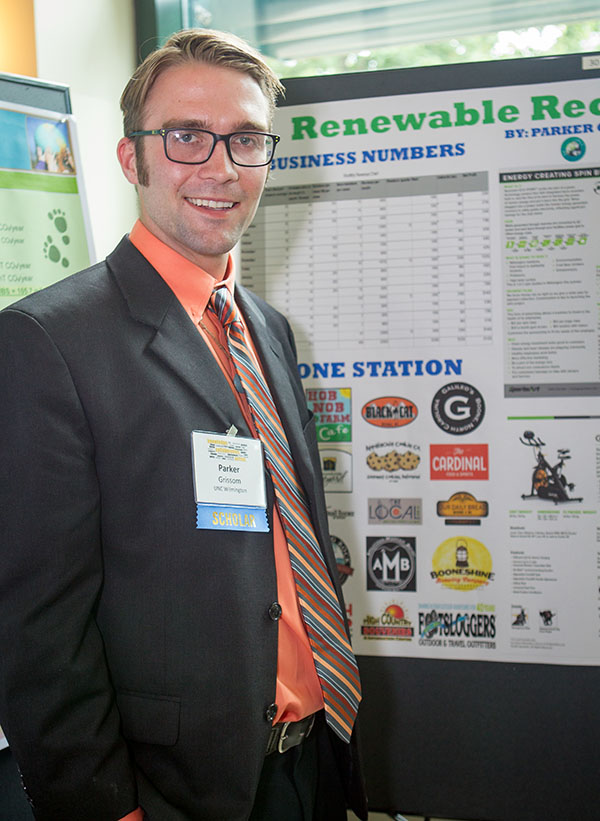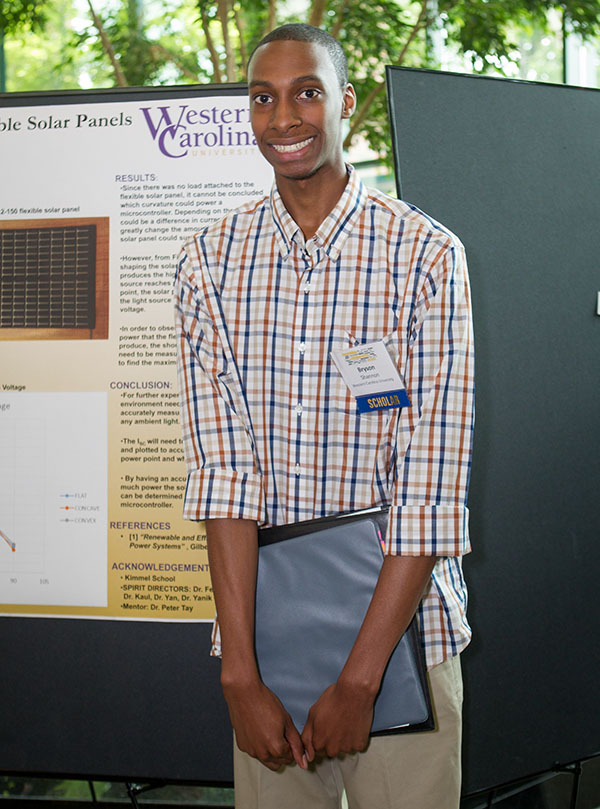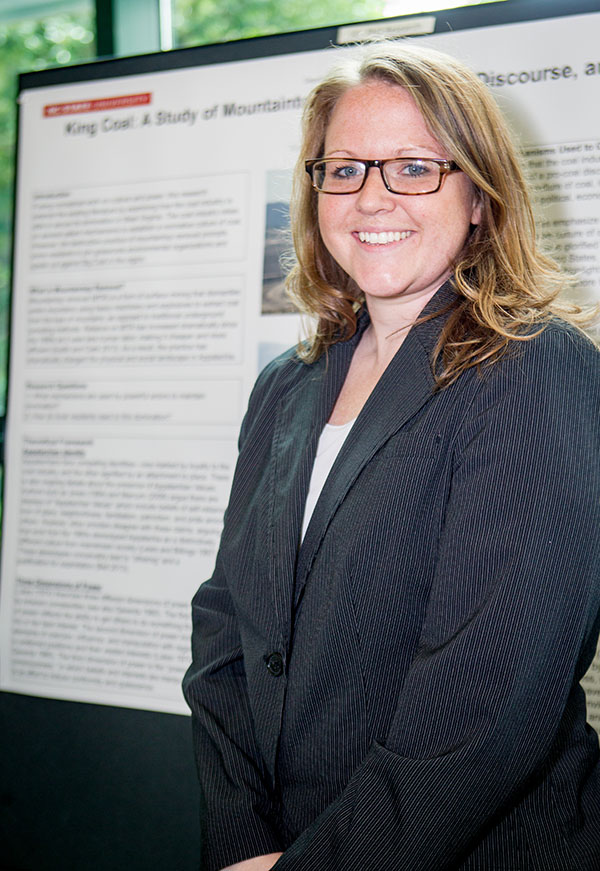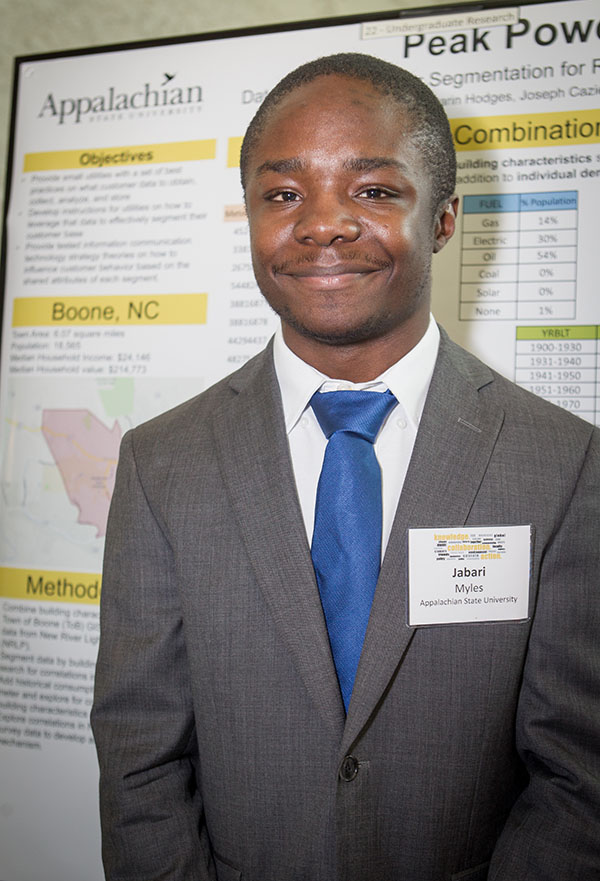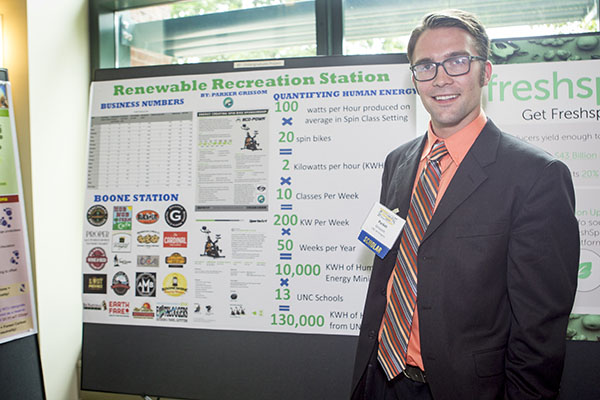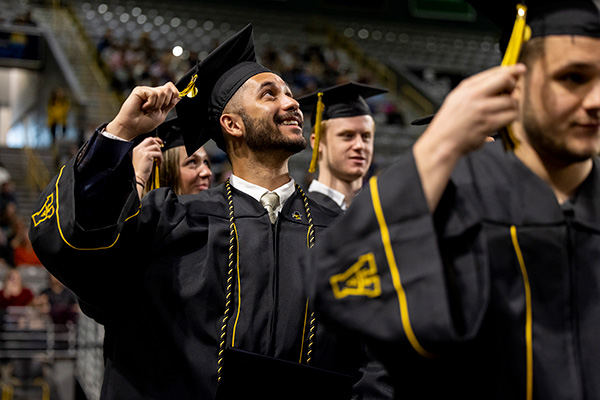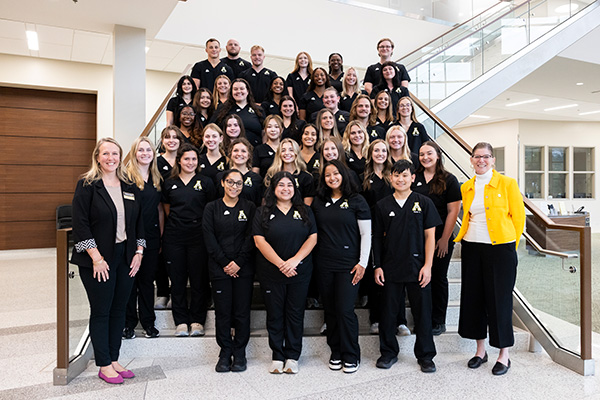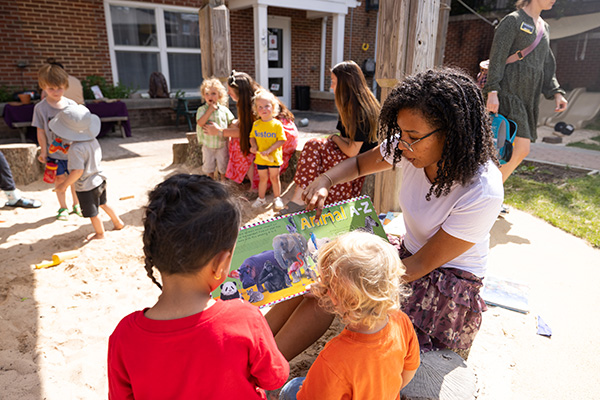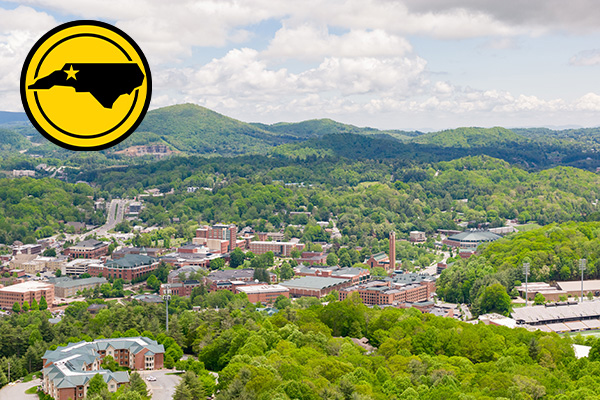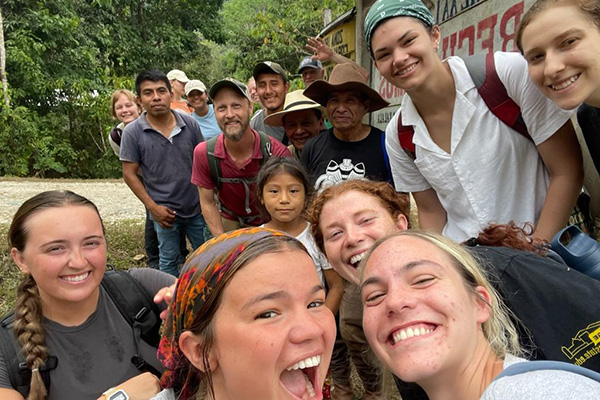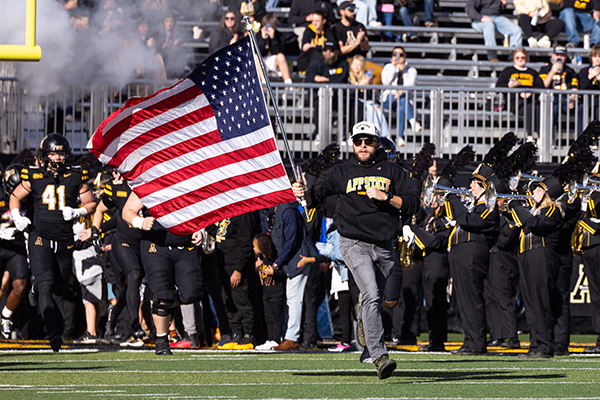The Student Summit, an important element of the Appalachian Energy Summit at Appalachian State University, provides the opportunity for students from campuses across the state and beyond to drive change and encourage the implementation of clean energy initiatives on their respective campuses.
At the 2016 event, 92 college students – more than at any previous summit – were vetted by professors and peers and invited to attend. During the summit they had the opportunity to meet with and engage key energy executives and innovators. Many of the students presented posters. Hear the stories, read the profiles of four of the students below.
Of academic and career interest to students were industry partners who brought real-world perspectives to the summit and shared corporate utility-centered advances and innovation. These speakers included Joel Olsen, O2 Energies, and Ivan Urlaub, NCSEA. The career panel included opportunities awaiting students in the energy and efficiency sectors. Panelists included Eric Burgoyne, DPR Construction; Wayne Rosa, Delhaize; Ryan Miller, Building Performance Association; and Allie Garrett, Z. Smith Reynolds fellow.
In addition, students participated in a young professionals panel to discuss how to get a “foot in the door” of the energy industry. Panelists at this session were David Lee, Lowe’s; Caroline Hansley, Greenpeace; Walter Putnam, Shift Equity; and Lauren Dykstra of Sunlight Financial.
Special Assistant to the Chancellor for Sustainability Ged Moody said, “Ninety students from North Carolina and around the country got an education from the leading minds in energy while also having their resumes placed in front of potentially hundreds of clean energy companies in the Southeast.”
Meet student researchers presenting at the 5th Annual Appalachian Energy Summit
Parker Grissom
UNC Wilmington
Major: Exercise Science
Hometown: Charlotte
Project: “The Human’s Ability to Generate Renewable Energy in a Spin Studio”
Transcript
My name is Parker Grissom. I was born in Denver Colorado. I lived in Huntington Beach, California for a little bit and then moved to Charlotte, North Carolina and went to middle school and high school there. I went to college at the University of North Carolina Wilmington at the beach. I majored in Exercise Science and I am the first ever non-business major with a minor in entrepreneurship. So, I have blazed a path for future entrepreneurs at UNCW. I still have one class to take so I am still technically a student.
This is my second year coming to the Appalachian Energy Summit. The first year was very eye opening. I was really excited just to be here. My idea was very big last year. I had a huge picture. It was basically impossible to do. The products are all there I just need a large amount of money to do it. After a year I have scaled it down to a feasible $50,000 investment needed. That’s why I wanted to come back to this and present this poster. It’s the same idea and the same big vision but and angel investor could do this. I can show that they can get a return on investment within a year. I could find an investor here. I customized it to Boone. This idea can ultimately be in any city in our country. I give a gym owner the ability to renew their facility through the re-creation of recreation.
Using solar, small-scale wind and human energy to create an energy balance between energy usage and energy creation. That’s the big dream. What I am doing now is I have the 20 spin bikes in a cycling studio scenario. Each person gets to ride the bike and make 100 Watts of energy and that class creates two Kilowatts of clean energy. We’re going to take over gyms cycling studios. We launch a marketing campaign encouraging people to come make energy at the gym. Once they get that taste of green they’ll think, “What’s next?” We’ve got solar. We’ve got small-scale wind turbines and we even have geothermal.
What’s the future of sustainability? We are officially at the wall. We have to fight our way out through sustainability and through protests. We have to get the dirty energy off the grid. The vision that I have is of the future. We’re going to have electric Ubers going between Airbnbs. No one is going to have a car. When you go to the gym. You’re going to be making energy. Everyone will be held accountable for the carbon that they put into the atmosphere. When that comes around there will be infrastructure changes. These changes will be slow but when they realize that the sea level has gotten to the point where they can’t have a hotel at a certain location. They’ll have to build a new one and the new one is going to be 100% clean energy powered sustainable. California is the visionary. Their new houses are built with solar panels.
What I’ve done with my business, Renewable Recreation, is put myself between now and then. I’ve tried to monetize it and ultimately be the go to company that a gym looks for in order to make the switch over to being green. Sustainability, to me, means that you’re able to be self-sustaining and not be reliant on the things around you. You are able to make your own things. You are able to ultimately not have to rely on anyone. That’s what sustainability is to me. You only rely on yourself.
“I see every gym in the world being a renewable power plant.”
Parker Grissom, an exercise science major at UNC-Wilmington, arrived at this idea through his work as a personal trainer. Motivating his clients was his inspiration: how do I get a person off the couch and into a gym? What reasons are good enough to bring gym and trainee together?
“Renewing energy is a good reason to exercise,” he decided. As a cycling class teacher he calculated one hour of exercise was roughly equivalent to two hours of energy. And what if an entire class exercised? One could, conceivably, generate 20 kilowatts of power per class, he reasoned. And the math works out exponentially, class by class, week by week.
Is this possible now?
“Right now,” Grissom said. “Gyms are energy pigs. If we could turn every YMCA into a power plant, it could help solve climate change.”
Grissom brings two passions to his idea. Originally from Colorado, he came to UNC-Wilmington to study marine biology. As he puts it, “I have the heart of a marine biologist, but the mind of an exercise scientist.” He jokingly addressed his switch from saving fish to helping solve increasing power needs: “Fish have no money,” he said. “You save them, they won’t pay you. But people…”
Joking aside, Grissom has turned a lucid eye to current energy problems and found a way to help solve them using an interdisciplinary approach, combining biology and mechanics to design the cardio equipment necessary to turn gyms into power plants. “The cardio equipment needed is ready to be mass produced,” he said.
When told this is an exciting dream, he paraphrased one of the great metaphysicians of the 20th century, actor Bruce Lee. “I’m just a finger pointing at the universe,” he said.
Bryson Shannon
Western Carolina University
Major: Electrical and Computer Engineering Technology
Hometown: High Point
Project: “Power Output of Flexible Solar Panels”
Transcript
My name is Bryson Shannon and I’m from High Point, North Carolina. I’m studying at Western Carolina University in Cullowee, North Carolina, studying electrical and computer engineering technology with a minor in math.
My research, I’m really into solar panels, but you can’t just do research on solar panels and then install it. You have to go through the government. You have to get permits to put them on your house. So from here I’m trying to understand from a business aspect what can I do, what can I learn, so it will be more affordable and more easy for people to have solar panels in the homes and residential areas. You need a lot of land. You need a lot of flat land for solar panels. A lot of people don’t like having solar panels on mountainsides. I don’t know why. There are a lot of aesthetic issues with it. Sometimes solar panels don’t look that great in certain places. So you’re not only battling where can you put it at, what looks pleasing to commercial people. I’m pretty confident about the future. With solar panels there is already research which is making them really really thin and flexible. You can put them on buildings. People put them on campers. People put them on their bikes. I feel that we need people from different areas. We need people young and old. Not just one generation can do it. We need people from different backgrounds with different experiences to help push this movement.
To me, sustainability means maintaining what was given to you. The earth gives us a certain amount of energy. The sun gives us energy, but it is for only a certain amount of time. Yes the sun is going to be there for billions and billions of years, but, the earth is reacting differently to it. There is climate change that’s affecting sunlight that is hitting the earth. So, me as an engineer, I want to create a project that helps sustain and maintain a certain amount of energy. To me sustainability is maintaining, keeping things at a good level. I realize that going through four years engineering, I’m a senior. I don’t know if I said that or not. I realize that I can’t do everything myself. I need other people’s experience and other people’s advice. That is one reason why I am here. I just want to inspire other people. I have a generation of people behind me, future engineers. I want them to look up to me and read my posters and research. I want them to know that is something that we all need to do. Not just one person can fix the world. Not just one person can change the environment. It has to be group, a collaborative group. We need to get out of our comfort zones and come to these conferences and meet different people. We need to talk with different universities and with different people from different backgrounds. We can’t do this alone. If we have this mindset of doing things by ourselves, with only one way of doing it, then we are not going to succeed.
Bryson Shannon, a computer and electrical engineering student at Western Carolina University, is at the summit to learn about laws, permits and government requirements for installing and using solar panels. He said, “You can’t just research solar panels and install them.” His research on flexible solar panels includes making them more affordable and also easy on the eyes.
He said, “I’m really into solar panels. I’m trying to understand from a business aspect what I can do, what can I learn that makes it more affordable and easier for people to have solar panels in their homes and residential and commercial areas.” He continued, admitting there can be biases against solar panels and the way they look in certain areas. “There are lots of aesthetic issues. You’re not only battling where you can put it, but what looks pleasing.”
What does he hope to gain from the Appalachian Energy Summit?
“Different views,” he said. “What can I do to make solar panels affordable? We need people from different areas, we need people young and old…from different backgrounds…to help push the movement.”
He would like to see everyone with solar panels. “Researchers are already making them really thin. People can put them on campers. People put them on bikes,” he said.
He’s quick to point out that he’s not trying to save the world. It all comes down to sustainability. “Sustainability means maintaining what’s been given to you. Maintain to a certain level of energy so that it can be renewed.”
And that’s why he is one of the scholars at the energy summit. He reiterates, “I’m not trying to save the world. I can’t do everything by myself. I want to inspire future engineers. No one person can fix the world. It has to be collaborative. That’s why it’s good to come to these conferences and share ideas.”
Aysha Bodenhamer
N.C. State University
PhD Candidate, Sociology
Hometown: Mount Airy
Project: “Mountaintop Removal in West Virgina”
Transcript
My name is Aysha Bodenhamer. We’re at the Appalachian Energy Summit at Appalachain State University. There are lots of interdisciplinary folks here who are very interested in sustainability and sustainable energy development.
As far as my work is concerned, I focus mainly on coal extraction and really the downside of coal and what is not necessarily great about it and why we should move away from it.
I was born and raised in Mt. Airy, North Carolina or Mayberry as people may be familiar with. I did my undergraduate work in Sociology and International Studies at Radford University. Then, I started a Masters and PhD program at NC State in Sociology. Now I am an environmental sociologist and PhD candidate which means that hopefully I will be graduating in the next year with my PhD and finding a job placement somewhere between here and there. The Appalachian Energy Summit is a unique opportunity to form these interdisciplinary relationships. Not only is it the technical side but it’s the policy and private sector as well as academia. All of these folks are really trying to come together to come up with solutions to climate change in particular. I am a sociologist so as far as being optimistic about the future, sometimes we fall on the pessimistic side but being here has really been rejuvenating. I think there is a lot of great work being done. It’s kind of the topic of our time. This is a pressing issue that we need to do something about and it’s really nice to see so many folks across generational lines young and old come together on this issue. So, yes, I would say I am much more optimistic these days than I have been in the past.
I think sustainability really means thinking about the future and not just shortsighted economic gains. It’s not just focusing on profit motivation but thinking about where the earth is going to be in 10, 20 50 or 100 years and beyond. Again, as a sociologist, I feel it’s not our place to exploit the earth like we have and I think it’s time for that change. Sociologists are trained to be critical of pretty much everything. That includes business and markets and how we tend to conduct business in the United States as well as around the world. I’ve also been taught Ecological Modernization Theory. Often times this theory is touted as, “The Greening of Capitalism.” It’s said to be a positive practice for the future. I was always very skeptical of that because it’s just the same system with a different name…or the same system with a slightly greener focus. I think, from what I’ve gathered, what’s the alternative? We have to change our practices as far as energy is concerned and as far as climate change is concerned. We can’t keep doing what we’re doing. I’d much rather have a green business than a business that doesn’t care about their workers or environmental impacts. I’d much rather see a green capitalism than the one we currently have. That’s where I am at this point. I asked a question of a speaker earlier. I asked, “How do you get big business out of our politics.” He said, “Right…that’s a good question or how can we bring them in? How can we garner their support for these initiatives?” I thought, “Yeah that’s an important distinction actually.” So, I’m a cautious optimistic.
“I’m a cautious optimist.”
Aysha Bodenhamer is an environmental sociologist in a sea of engineers and business people attending the student poster session of the Appalachian Energy Summit. The summit broaches the questions of the future of energy in an interdisciplinary way. Bring young scholars from all corners of the academic disciplines and universities in the UNC system and beyond, and let them exchange ideas. It has been a good meeting for Bodenhamer.
“I’m a sociologist,” she said. “We tend to fall on the pessimistic side. But being here is rejuvenating. It’s nice to see all these generational issues come together.”
Bodenhamer studies mountaintop removal in West Virginia and she approaches it from the humanistic side. “There are lots of engineers here and they can tell you the environmental impact of mountaintop removal,” she said. “I’m a social scientist. I’m concerned with how it impacts people and communities.” Her work deals with coal extraction and the downside of coal as an energy resource.
When asked about how she views the future, she is cautious. “Sociologists are trained to be critical of pretty much everything. Business and markets around the world.” But she brightens and says, “What’s the alternative? We have to change.” She added, “I’d rather see a green capitalism than the one we already have.”
So, there’s hope for the future?
“I’m a cautious optimist,” she said.
Jabari Myles
Appalachian State University
Hometown: Durham
Major: Economics and Computer Information with a minor in statistics
Project: “Peak Power Profiling”
Transcript
My name is Jabari Myles. I’m a student at Appalachian State University. I’m from Durham, North Carolina. I’m a rising senior and I am a double major in Economics and Computer Information Systems with a minor in Statistics.
I’m here at the 2016 Appalachian Energy Summit with the greatest minds and the greatest talent in energy and sustainability in North Carolina. We are all sharing our ideas and inspiring each other and networking. It’s really just amazing to see everyone come together and share all of their ideas and different ways of going about being more sustainable and more efficient. I hope at the energy summit that I can share my research and inspire other people to become more sustainable and to reduce their energy consumption and find ways of being more sustainable. That will hopefully leave a better planet for future generations.
I’m predicting peak energy in North Carolina and Boone. I’m working with New River Light and Power to understand their customers better and figure out how to influence them and decrease their demand during peak energy hours when demand is dirtiest for consumers and for New River. If you asked me a few weeks ago I probably wouldn’t have been as optimistic as I am right now but seeing everyone come together as they are right now and share all of their ideas and see that this many people are passionate about it, I can’t help but be optimistic.
Sustainability is reducing your footprint whenever possible. It’s a selfless act and it’s something that we have to appreciate and see on a bigger scale. We have to see other people demonstrating it for us to actually become involved. It’s something that everyone can do. You don’t have to join a club or do it on a major scale with a giant corporation you can do it at your own home. I’m a statistician so I don’t know too much about the energy field right now but seeing all these people here right now inspired me to want to do it more. I feel like it’s very infectious. After you do it once you want to do it again. It’s really something everyone can come together to do as well.
Jabari Myles is a rising senior at Appalachian State University. He is a double major in economics and computer information systems, with a minor in statistics. His reason for attending the Appalachian Energy Summit was to “share my research and inspire people to become more sustainable.”
He’s doing that by working with New River Light and Power and figuring a way to decrease power demand when demand is “the dirtiest.”
Dirtiest?
Myles explained, “Energy is dirty when demand is highest. The price gets more expensive. I’m predicting peak energy hours in North Carolina and Boone. I’m working with New River Light and Power to actually understand their customers better and figure out how to influence them and decrease their demand during peak energy hours.”
This is an ongoing process, but that is why Myles is at the summit. The summit has also made him a little more optimistic about the future.
“A few weeks ago,” he said, “I wouldn’t have been as optimistic [about the future]. But being here has renewed me.” And the future belongs to everyone, Myles said, just as everyone has to be accountable for reducing their carbon footprint whenever possible. “This is something everyone can do. You don’t have to do it on a major scale,” he said.
By seeing scholars from all UNC universities come together at Appalachian, Myles witnessed other people with his same concerns offering ideas to one another. “Seeing these people has inspired me,” he said, smiling. “It’s very infectious.”
What do you think?
Share your feedback on this story.
July 25, 2016
With the theme of “Knowledge. Collaboration. Action.”, Appalachian welcomes more than 450 leaders to its 5th Annual Appalachian Energy Summit.
About Sustainability and Energy Management at App State
Appalachian State University’s leadership in sustainability is known nationally. The university’s holistic, three-branched approach considers sustainability economically, environmentally and equitably in relationship to the planet’s co-inhabitants. The university is an active steward of the state’s interconnected financial, cultural and natural resources and challenges students and others think critically and creatively about sustainability and what it means from the smallest individual action to the most broad-based applications. The university offers both undergraduate and graduate academic degree programs that focus on sustainability. In addition, 100 percent of Appalachian’s academic departments offer at least one sustainability course or course that includes sustainability, and all students graduate from programs that have adopted at least one sustainability learning outcome. Learn more at https://appstate.edu/sustainability.
About Appalachian State University
As a premier public institution, Appalachian State University prepares students to lead purposeful lives. App State is one of 17 campuses in the University of North Carolina System, with a national reputation for innovative teaching and opening access to a high-quality, cost-effective education. The university enrolls more than 21,000 students, has a low student-to-faculty ratio and offers more than 150 undergraduate and 80 graduate majors at its Boone and Hickory campuses and through App State Online. Learn more at https://www.appstate.edu.
